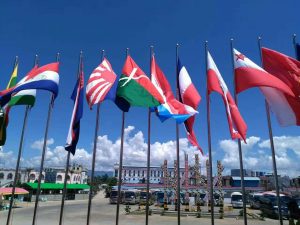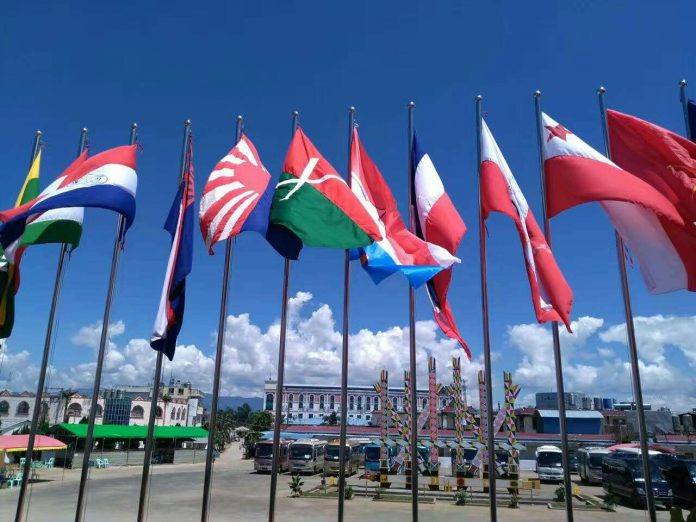Preamble: We, the people of Burma, including the frontier areas and the Karenni states, are determined to establish in strength and unity a sovereign independent state, to maintain social order on the basis of the eternal principles of justice, liberty and equality and to guarantee and secure to all citizens justice social, economic and political; liberty of thought, expression, belief, faith, worship, vocation, association and action; equality of status, of opportunity and before the law, in our constituent assembly this tenth day of Thadingyut waxing, 1309 b.e. (twenty-fourth day of September, 1947 a.d.), do hereby adopt, enact and give to ourselves this constitution. (Ref: Constitution of Burma, 1947)
Since the above preamble was written over 60 years ago, ethnic armed conflict has yet to be resolved. However, the peace process is under implementation, the people of Myanmar, formerly known as Burma, expect lasting peace and a consolidated democracy. The mission is possible for our nation and people. The question of constitutional power for the ethnic state and people should be addressed in both a legal and constitutional context.

Armed ethnic leaders have shown two strategies for winning peace and political legitimacy over the past sixty years but the last strategic resort is on display. The military offensive strategy has proven less desirable to gain victory and failed in political legitimacy in modern liberation movements across Southeast Asia. The remaining political mobilization strategy is high stakes. The ethnic armed leaders have been touring the motherland, at the heart of the political capital in Yangon, Mandalay and other ethnic states over the past five years. The process of winning peace will never be complete unless the public model is attached to the discourse.
The ethnic armed leaders have two fronts for a new political legitimacy within the new context of Myanmar’s constitutional parliament. The issues of a national defense force and the constitutional power for the ethnic states. This article is on the explored issues of constitutional power of the ethnic states. This is at the heart of the matter of the peace process and for future policy framework for the ethnic armed leaders’ next roundtable conference. The ethnic armed leaders have been working, writing and advocating for constitutional power over the past 15 years after the first ceasefire agreements were signed by most of the ethnic armed groups. It is pointless for the armed ethnic leaders to push a ‘federal model’ institution unless the current NLD’s Government and the Military Force of Myanmar (Tatmadaw) support, in principle, that constitutional power for the ethnic states be debated in the Union Parliament in the next 1-2 years sitting.
The constitutional power of the ethnic states must be set as the first agenda in the next series of peace conferences by the armed ethnic leaders. However, the NLD’s government should be given time and space for further legal and constitutional frameworks for the parliamentary debate. A process of creating constitutional power for the ethnic states should be supported by the legal and international constitutional experts but the local Myanmar’s context must be adhered to, morally and culturally.
The ethnic armed leaders and politicians called for a formation of the ethnic Burman’s State, or Burmese ethnic states, in the recent conference held in Kachin territory. Regardless of rhetoric held by the ethnic leaders, a formation of a new state (for either Burma’s race, or other races) shall be explored from the perspective of the nation’s social, political and security contexts. It is a proposal that could delay a healthy or mature debate on the constitutional powers of ethnic states if the peace process is not sustained long term. The armed ethnic leaders, politicians and activists have the vital role in the peace process but the ‘balancing act’ should be maintained in order to restore ‘faith and trust’ between the Burmese race and ethnic races, at least in seeking political powers.
The principle of federalism is not a ‘written in the stone’ in modern political literature, either in the eastern or western world. However, it is a process of sharing ideas and resources between legal, social and political institutions within a set of rules. The ethnic armed leaders have options in many aspects to win legitimacy within Myanmar. Not least is that election for a local seat by local people to local government is on the cards. Therefore, the armed ethnic leaders must propose for a ‘federal model’ to be open for further debate instead of standing by the ‘red line’.
In February 2017, the preamble of independence will mark the 70th anniversary in Myanmar. An aspiration of ‘justice social, economic and political; liberty of thought, expression, belief, faith, worship, vocation, association and action; equality of status, of opportunity and before the law’ should be articulated by action. The last step for the armed ethnic leaders to pave the way towards political power, constitutional power of the state and its legitimacy needs to be acted in a balanced way, for the public expects lasting peace, security and harmony for the next generation.
Armed ethnic leaders firmly acknowledged to the world’s leaders their painful war experiences in the quest for peace, stability and regional security. The rights to rule must be agreed upon but constitutional power for the ethnic states should be debated locally, nationally and internationally by the diverse people of Myanmar’s land.
The armed ethnic leaders and soldiers must be acknowledged that they sacrificed their entire lives to the nation and people of diverse races. Constitutional rights must be guaranteed in the peace process and beyond. The next stage is to call a separate election for the State Parliament and Government. This is the next agenda for the peace agreement. The constitutional writing process should be inclusive for the next 2-3 years in the making.
It is the last option that the armed ethnic leaders have called for. Constitutional power to the ethnic states for lasting peace but the process must be a ‘balancing-act’ for fruitful outcomes for the people. This is the last step of the 60-year war for peace. Its legitimacy shall be in written in the history books as the making of modern Myanmar. Constitutional power for the ethnic states will be the last battle to be won by the armed ethnic leaders through a pen, not a fire-arm. A pen is cheaper than a gun, at least by the price, let alone the cost of human lives.

